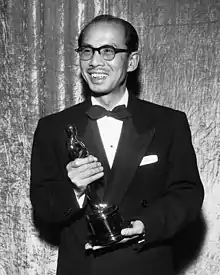Masaichi Nagata | |
|---|---|
 Nagata at the 27th Academy Awards | |
| Born | 21 January 1906 Kyoto, Japan |
| Died | 24 October 1985 (aged 79) Tokyo, Japan |
| Occupation(s) | Daiei president, film producer, baseball executive |
| Years active | 1925–1980 |
| Children | 2[1] |
|
Baseball career | |
| Member of the Japanese | |
| Induction | 1988 |
Masaichi Nagata (永田 雅一, Nagata Masaichi, 21 January 1906 – 24 October 1985) was a Japanese businessman and served as president of Daiei Film. The self-proclaimed creator of Gamera, he produced the kaiju's second film Gamera vs. Barugon, with the remainder of the Showa Gamera films produced instead by his son Hidemasa Nagata.
Film career
Born in Kyoto, Nagata attended the Ōkura Kōtō Shōgyō Gakkō (now Tokyo Keizai University), but left before graduating.[2] He joined the Nikkatsu studio in 1925 and, after working as a location manager, rose to become head of production at the Kyoto studio.[3] Experiencing conflicts with the Nikkatsu president, he left the company in 1934, taking many Nikkatsu stars with him, to form Daiichi Eiga.[3] While short-lived, that studio created such masterpieces as Kenji Mizoguchi's Sisters of the Gion (1936) and Osaka Elegy (1936). When Daiichi Eiga folded, Nagata became head of the Kyoto studio of Shinkō Kinema until the government reorganized the industry during World War Two. Against a government plan to combine the fiction film companies into two studios, Nagata fought hard for the alternative option of creating a third studio.[4] His efforts resulted in the creation of the Daiei Motion Picture Company, where he first served as an executive.[3] He rose to become president in 1947 and, apart from a brief period when he was purged by Occupation authorities, remained in that position until 1971.[2]
Under his reign, Daiei produced Akira Kurosawa's Rashomon (1950) and entered it in the Venice Film Festival, where it won the grand prize and became the first Japanese film to win an international award,[5] thus introducing Japanese cinema to the world. Nagata also spurred the production of Teinosuke Kinugasa's Gate of Hell (1953), the first Japanese color film to be shown abroad, earning both an honorary Academy Award for Best Foreign Language Film[6] and the Palme d'Or at the Cannes Film Festival.[7] Nagata also produced such renowned films as Mizoguchi's Ugetsu (1953) and Sansho the Bailiff (1954), as well as Jokyo (which was entered into the 10th Berlin International Film Festival[8]). On the popular front, Nagata's Daiei was also known for such successful film series as the Zatoichi films starring Shintaro Katsu, the Sleepy Eyes of Death series featuring Raizō Ichikawa, and the Gamera movies.
Due to the decline of the film industry, and Nagata's extravagant expenditures, Daiei went bankrupt in 1971,[2] but he continued as an independent producer for some years after that. He produced more than 160 films during his career.[9]
Baseball
During the age when many Japanese film studios owned professional baseball teams, Nagata served as owner first of the Daiei Stars, and then of the Daimai Orions when the Stars merged with the Mainichi Orions in 1958.[2] He promoted the two-league system, helped build Tokyo Stadium, and became the first president of the Pacific League in Japan.[10] He was inducted into the Japanese Baseball Hall of Fame in 1988.[10]
Selected filmography
- Sisters of the Gion (1936)
- Osaka Elegy (1936)
- Rashomon (1950)
- Miss Oyu (1951)
- Tetsu no tsume (1951) aka Claws of Steel
- The Tale of Genji (1951)
- Ugetsu (1953) aka Tales of Ugetsu
- Gate of Hell (1953)
- Sansho the Bailiff (1954)
- The Crucified Lovers (1954)
- Princess Yang Kwei-Fei (1955)
- The Phantom Horse (1955)
- Shin Heike Monogatari (1955)
- Warning from Space (1956)
- Street of Shame (1956)
- Zangiku monogatari (1956)
- Suzakumon (1957)
- The Loyal 47 Ronin (1958)
- The Snowy Heron (1958)
- Enjō (1958)
- Floating Weeds (1959)
- Fires on the Plain (1959)
- Odd Obsession (1959)
- Jokyo (1960)
- Her Brother (1960)
- An Actor's Revenge (1963)
- Gamera (1965)
- The Hoodlum Soldier (1965)
- Shiroi Kyotō (1966)
- Gamera vs. Barugon (1966)
- Zatoichi the Outlaw (1967)
- Nichiren (1979)
Bibliography
- Nagata, Masaichi (1953). Eigadō masshigura. Tokyo: Surugadai Shobō.
- Nagata, Masaichi (1957). Eiga jigakyō. Tokyo: Heibon Shuppan.
References
- ↑ 2018年11月23日2019年3月14日 (23 November 2018). "永田雅一の息子は永田秀雅。孫はいたの?晩年や養女の有無について。 | 芸能人の息子まとめ". xn--o9jl2cn5979an1pggi321e5id.com (in Japanese). Retrieved 7 May 2021.
{{cite web}}: CS1 maint: numeric names: authors list (link) - 1 2 3 4 "Nagata Masaichi". Keizai ketsubutsu retsuden. Jabira. Archived from the original on 2 April 2012. Retrieved 21 September 2011.
- 1 2 3 Hirukawa, Kōtarō. "Daiei shi". Daiei Kyōto Satsueijo to sono chiiki. Archived from the original on 24 March 2012. Retrieved 21 September 2011.
- ↑ Shoemaker, Greg. "Daiei: A History of the Greater Japan Motion Picture Company". The History Vortex. Archived from the original on 20 July 2011. Retrieved 24 September 2011.
- ↑ "Master director dies". BBC News. 6 September 1998. Retrieved 22 September 2011.
- ↑ "1954: Best Foreign-Language Film". All about Oscar. Britannica. Retrieved 22 September 2011.
- ↑ "Awards 1954". Festival de Cannes. Retrieved 22 September 2011.
- ↑ "IMDB.com: Awards for Jokyo". imdb.com. Retrieved 17 January 2010.
- ↑ "Nagata Masaichi". Japanese Movie Database. Retrieved 25 September 2011.
- 1 2 "Nagata, Masaichi". Hall of Famers List. The Baseball Hall of Fame and Museum. Archived from the original on 1 January 2020. Retrieved 24 September 2011.
External links
- Masaichi Nagata at IMDb
- Nagata Masaichi at the Japanese Movie Database (in Japanese)